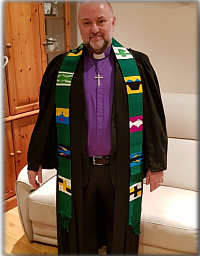Carl's Monthly Message
Our Minister's Letter
Dear Friends
As I sit at my desk in the manse, looking out at blue skies, my mind drifts back to the summers of childhood. Like many my age, memories of summertime as a child are overwhelmingly about being outdoors, mostly with no adult supervision. I don’t know if it’s my mind playing tricks, but childhood summers were long and (mostly) dry. Living on the North East coast, I especially remember days at the beach, swimming in the North Sea (the cold was only momentary), playing on the beach, and hunting in rockpools. On some days, Mum would be there with a packed lunch, on others, hunger would send us home at lunchtime. The worst that ever happened was when the haar, or sea-mist, came rolling in, hiding the sun and sending us home early.
Today, of course, life is very different but, without a doubt, summer is still my favourite time of year. I love the feeling of the sun, or cooling breeze, on arms and legs that are mostly covered the rest of the year. I love the long hours of daylight, the bird song and the more relaxed pace of life that summer seems to bring. I especially love the fact that, living in Inverurie, the haar never rolls in to spoil the day!
But, ‘haar’ can come in different forms: doubt, bad news, accident, illness and other troubles appear when we least expect them, transforming what had been a time of relative happiness to a time of endurance. At these times, the worst thing we can do is focus on the haar. As a child, though the haar drove me from the beach, I was sure it would be gone the next day, so I simply entertained myself at home. The ‘haars’ of adulthood, doubt, bad news, etc, will, more than likely, last longer than the rest of the day, they may last years, but the solution is the same: don’t focus on the haar! Why? Because, perhaps the worst effect of problems is that they can stop us seeing what is good. The temperature dropped when the haar rolled in, because it stopped the suns rays reaching us, but the sun was still there. In the same way, in times of difficulty we can lose sight of what is good in our lives. The good is still there, but the difficulties just seem to get in the way. The author, Rachel Joyce, put this another way, ‘The sky and the sun are always there. It's the clouds that come and go.’
But, of course, the Bible has the best advice to help for those struggling:
‘It is the Lord who goes before you. He will be with you; He will not fail you or forsake you. Do not fear or be dismayed.’ (Deuteronomy 31:8)
‘God is our refuge and strength, a very present help in trouble.’ (Psalm 46:1)
‘The steadfast love of the Lord never ceases, His mercies never come to an end; they are new every morning; great is Your faithfulness.’ (Lamentations 3:22-23)
‘Peace I leave with you; My peace I give to you. I do not give to you as the world gives. Do not let your hearts be troubled, and do not let them be afraid.’ (John 14:27)
May your haars always clear quickly.
Many blessings,
Carl

